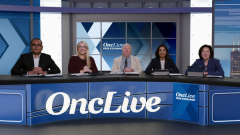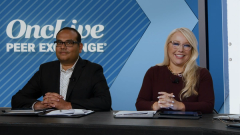
Frontline Combination Strategies in HR+/HER2- BC
A brief review of frontline combination strategies in the context of multiple driver pathways in HR+/HER2- breast cancer.
Episodes in this series

Transcript:
Hope S. Rugo, MD, FASCO: What do you think about adding in other agents? There are a lot of studies that are looking at triplets and different therapies in combination. Aditya [Bardia, MD, MPH] actually did work on a study using a low dose of everolimus in combination, which seemed to be quite effective in my patients that were on the study who had already progressed on CDK4/6 [cyclin-dependent kinase 4/6] inhibitors; there’s a whole new approach to that now.
Komal Jhaveri, MD, FACP: Absolutely, I’ll add to the list of CDK4/6 inhibitor resistance alterations that we’re thinking about. I want to say that [a] majority of the work is still unknown, and we still have a lot more to learn because these tumors are very heterogeneous and we really must put in a lot more effort than we currently already are. Having said that, some other mechanisms that have also emerged from all our work so far have been ERBB2 mutations, there have been [INAUDIBLE] function mutations that have been reported out. Our group, in addition to the RB1 loss and the RB mutation story that Aditya was talking about, also reported on FAT1 loss and how that leads to Hippo pathway activation via CDK6 expression; this is what comes out of [INAUDIBLE] lab. We’re working on all these mechanisms, and we’re trying to understand how we can use the acquired mechanisms of resistance as a way of a target for newer targeted therapy. Work done from the Boston group had talked about the aurora kinase amplifications, and we’ve seen aurora kinase inhibitors such as alisertib that were studied in patients who progressed on CDK4/6 inhibitors. With alisertib, we did see an overall response rate of 20%, which was rather respectful. To your point about the triplet strategies, [INAUDIBLE] pathway activation we think about that as a mechanism of endocrine resistance, but really if we think about it, that’s downstream. We see that there is CDK and there is synergistic activity for CDK, PI3K, and then ER, and so we’re trying to see if for patients with PIK3C mutations could there be a strategy for combining the triplet, maybe with an AKT inhibitor. We have the CAPItello-292 study (NCT04862663) with capivasertib with that triplet; we have inavolisib with fulvestrant and palbociclib trying to do that. I think we’re trying to see if, for a particular group of patients who have endocrine-resistant disease, who have a known oncogenic driver, can we utilize and justify additional toxicity from a triplet strategy, and will that have an impact on outcomes? There are various approaches we’re trying to take in clinic to address this post-CDK4/6 inhibitor progression.
Hope S. Rugo, MD, FASCO: We’ll talk about an interesting trial in a little bit that looked at post-CDK4/6, CDK4/6. I do think it is interesting because up in the front line, a lot of the triplet studies are being looked at, too, and it does beg the question: Each time you add a drug, you’re going to add some toxicity and a lot of cost. How are you going to take all those? If you’re going to take them for 10 years, is that going to really be tolerable and manageable? It will be interesting to see what kinds of gains we can see out of these trials, of which there are now many. The everolimus sort of fell by the wayside because we had alpelisib and it was too toxic in the triplet, so it’s really all the next generation agents now; capivasertib, ipatasertib as AKT inhibitor.
Transcript edited for clarity.








































